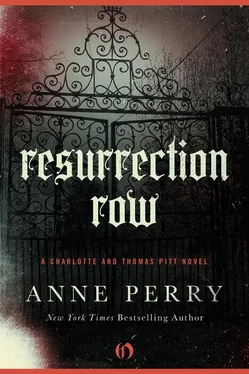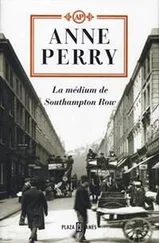Anne Perry - Resurrection Row
Здесь есть возможность читать онлайн «Anne Perry - Resurrection Row» весь текст электронной книги совершенно бесплатно (целиком полную версию без сокращений). В некоторых случаях можно слушать аудио, скачать через торрент в формате fb2 и присутствует краткое содержание. Жанр: Исторический детектив, на английском языке. Описание произведения, (предисловие) а так же отзывы посетителей доступны на портале библиотеки ЛибКат.
- Название:Resurrection Row
- Автор:
- Жанр:
- Год:неизвестен
- ISBN:нет данных
- Рейтинг книги:5 / 5. Голосов: 1
-
Избранное:Добавить в избранное
- Отзывы:
-
Ваша оценка:
- 100
- 1
- 2
- 3
- 4
- 5
Resurrection Row: краткое содержание, описание и аннотация
Предлагаем к чтению аннотацию, описание, краткое содержание или предисловие (зависит от того, что написал сам автор книги «Resurrection Row»). Если вы не нашли необходимую информацию о книге — напишите в комментариях, мы постараемся отыскать её.
Resurrection Row — читать онлайн бесплатно полную книгу (весь текст) целиком
Ниже представлен текст книги, разбитый по страницам. Система сохранения места последней прочитанной страницы, позволяет с удобством читать онлайн бесплатно книгу «Resurrection Row», без необходимости каждый раз заново искать на чём Вы остановились. Поставьте закладку, и сможете в любой момент перейти на страницу, на которой закончили чтение.
Интервал:
Закладка:
Dominic opened his mouth to say he wanted to leave, then saw the children’s faces gaping up at him: young bodies, young skins, and eyes as old as the roues’ he had seen with the prostitutes in the night houses of the Haymarket. It was the weary avariciousness in them that frightened him more than anything else; that and the smell.
He saw one urchin, chased by another in play, pass close to Carlisle, and, in a movement as smooth as a weasel, extract his silk handkerchief from his pocket and move on.
“Carlisle!”
“I know,” Carlisle said quietly. “Don’t make a fuss. Just follow me.” And he moved almost casually over the street, onto the pavement on the other side, then down the alleyway. At the far side of the square beyond, he stopped at the large, blind wooden door and knocked. It was opened by a stout man in a green frock coat. The sour expression on his face changed to one of alarm, but before he could speak, Carlisle stepped inside, forcing him back.
“Morning, Mr. Eades. Comes to see how you are today.”
“Well, thank you. Yes, very well, sir.” Eades said defensively. “You are too kind, sir. You pay too much attention. I’m sure your time is valuable, sir.”
“Very,” Carlisle agreed. “So don’t let us waste it. Any of your children gone to the schools since the last time I was here?”
“Oh, yes! As many as we had at the time of intake, sir, you may be sure.”
“And how many is that?”
“Ah, well now; I don’t have the precise figures to my mind; you must recall, people come and go here, as the necessity finds them. If they are not here on the day of intake, which you must know is only once a fortnight, then, naturally, they don’t go!”
“I know that as well as you do,” Carlisle said tartly. “I also know they check out the day before the intake, and back in again the day after.”
“Now, sir, that ain’t my fault!”
“I know it isn’t!” Carlisle’s voice was raw with anger at his own impotence. He strode past Eades and down the airless, dank corridor to the great hall, and Dominic was obliged to follow him or be left alone in the stone passage, his flesh standing out with cold.
The room was large and low, gaslit; one stove burned in the corner. About fifty or sixty men, women, and children sat unpicking old clothes, sorting the rags, and cutting and piecing them together again. The air was so fetid it caught in Dominic’s throat, and he had to concentrate to prevent himself from vomiting. Carlisle seemed to be used to it. He stepped over the rags and approached one of the women.
“Hello, Bessie,” he said cheerfully. “How are you today?”
The woman smiled, showing blackened teeth, and mumbled something in reply. She had a large, shambling figure, and Dominic would have judged her to be about fifty. He did not understand a word of her speech.
Carlisle led him on a few yards to where half a dozen children sat unpicking old trousers, some of them no more than three or four years old.
“Three of these are Bessie’s.” He looked at them. “They used to work at home, before putting the new railway through caused the slum clearance, and the house their room was in was demolished. Her husband and older children made match boxes at tuppence ha’ penny for a hundred and forty-four, and out of that they found their own twine and paste. Bessie herself worked in the Bryant and Mays match factory. That’s why she speaks so oddly-phossy jaw-a necrosis of the jaw caused by the phosphorus in the matches. She’s three years older than Alicia Fitzroy-Hammond-you wouldn’t think it, would you?”
It was too much. Dominic was bewildered and appalled. “I want to get out of here,” he said quietly.
“So do we all.” Carlisle embraced the room in a gesture. “Do you know third of London lives no better than this, either in the rookeries or the workhouses?”
“What can anybody do?” Dominic said helplessly. “It’s-it’s so-vast!”
Carlisle spoke to one or two more people; then he led Dominic back out into the square again, bidding Mr. Eades a tart farewell on the doorstep. After the thick air inside, even the gray drizzle seemed cleaner.
“Change some of the laws,” Carlisle replied. “The meanest ledger clerk who can write or add is a prince compared with these. Get pauper children educated and apprenticed. There’s little you can do for their parents, except charity; but we can try for the children.”
“Possibly.” Dominic had to walk sharply to keep up with him. “But what is the point in showing me? I can’t change laws!”
Carlisle stopped. He passed a few pence to a child begging and saw him immediately hand them over to an old man.
“Fancy sending your grandchild out to beg for you,” Dominic muttered.
“He’s more likely no relation.” Carlisle kept on walking. “He probably bought the child. Children make better beggars, especially if they are blind or deformed. Some women even cripple them on purpose; gives them a better chance of survival. To answer your question, you can talk to people like Lord Fleetwood and his friends, persuade them to go to the House and vote.”
Dominic was horrified. “I can’t tell them about this sort of thing! They’d-” He realized what he was saying.
“Yes,” Carlisle agreed. “They would be disgusted and offended. Most distasteful. Not the sort of subject a gentleman embarrasses others with. I think I rather spoiled your luncheon the other day. You don’t get the same pleasure out of roast goose when you think about something like this, do you? And yet how far do you think it is from Gadstone Park church pews to Seven Dials?” They turned the corner into another street and saw a cab at the far end. Carlisle increased his pace, and Dominic had almost to trot to keep up with him. “But if I can court a cold-blooded sod like St. Jermyn,” Carlisle continued, “to get a bill introduced, I think you can manage a little discomfort with Fleetwood, can’t you?”
Dominic spent a wretched evening and woke the next morning feeling no better. He told his valet to have all his clothes cleaned, and if the smell would not come out, then to give them away to whosoever would take them. But nothing so simple would get rid of the pictures from his mind. Part of him hated Carlisle for obliging him to see things he would much rather not ever have known of. Of course, he had always appreciated in his head that there was poverty, but he had never actually seen it before, one did not really see the faces of beggars in the streets; they were simply faces, there-like lamp posts or railings. One was always about some business of one’s own and too occupied to think of them.
But worse than the sight was the taste of it in his mouth, the smell that stayed at the back of the throat and tainted everything he ate. Perhaps it was guilt?
He had arranged to take Alicia on an errand she had some little distance away, and he had taken a carriage for the occasion. He called for her at a quarter-past ten, and she was ready, waiting for him, although of course she did not allow it to be obvious, in fact, might even have imagined he did not see it. Possibly she forgot he had been married and was acquainted with at least some of women’s habits.
She was dressed in black and looked particularly fine, her hair bright and her skin flawless, with the delicacy of alabaster. Everything about her was impeccably clean. It was impossible to equate her in any way with the woman in the workhouse.
She had been talking to him, and he was not listening. “Dominic?” she said again. “Are you unwell?”
He needed to share the turmoil inside him; indeed, he could not keep his mind upon anything else. “I met your friend Carlisle yesterday,” he said harshly.
She looked surprised, surely at his tone rather than the information. “Somerset? How was he?”
Читать дальшеИнтервал:
Закладка:
Похожие книги на «Resurrection Row»
Представляем Вашему вниманию похожие книги на «Resurrection Row» списком для выбора. Мы отобрали схожую по названию и смыслу литературу в надежде предоставить читателям больше вариантов отыскать новые, интересные, ещё непрочитанные произведения.
Обсуждение, отзывы о книге «Resurrection Row» и просто собственные мнения читателей. Оставьте ваши комментарии, напишите, что Вы думаете о произведении, его смысле или главных героях. Укажите что конкретно понравилось, а что нет, и почему Вы так считаете.












